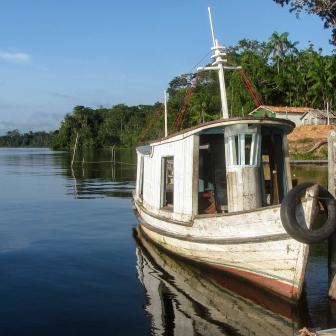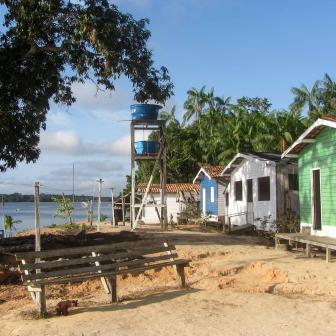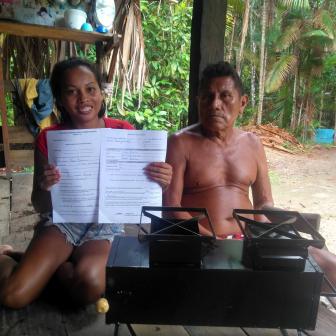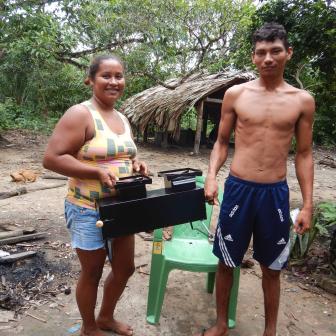Climate Action Insights: Where forest and water protection come together
March 19, 2021An interview about the work of our carbon offset project Portel on the occasion of the UN International Day of Forest and UN World Water Day.
The 21st and 22nd March mark the dates of the United Nations International Day of Forests and World Water Day. The initiatives draw attention to the importance of these two natural resources as we often overlook the close connection between forests and water, their limited occurrence and endangerment. Climate action and with it the path to net zero is not possible without thoughtful, sustainable use of both resources. Trees and oceans are invaluable CO2 reservoirs as well as vital food sources.
Our carbon offset project in the Brazilian Amazon region in Portel highlights this close connection. Here, people live along the waterways of the rainforest, in harmony with woodland and water. Together with our customers, we have been supporting the project for 12 years. It combines environmental and climate action as well as the preservation of biodiversity with important social development for the local people.
Even in times of the global Corona pandemic, we were able to continue our work in Portel. During the past year, we accomplished many goals to further protect the region and improve the infrastructure for the communities. Robin Stoffers, our Head of Project Development at ClimatePartner provides an update on the progress.
Robin, can you please explain how many families in Portel were supported last year and what activities are taking place? How does it work with the land use rights?
Together with our local partners, we were able to help 700 residents obtain legal land tenure rights last year. In terms of area, that is more than 50,000 hectares of protected land. The granting of official land rights is so important because, according to Brazilian law, land that is not owned can simply be confiscated, deforested, and cultivated. This disproportionately affects the residents of the Amazon region.
With our project, we are helping them to survey and officially register their land in the environmental registry. The granting of tenure rights to the inhabitants stipulates that the land on which their villages are built, and surrounding areas also belong to them. In this way, ownership ensures the protection of the area and creates awareness of responsibility and respect for the forest.
How does this process work in concrete terms?
Each future owner signs a conservation agreement when the land is granted, thus ensuring that the land does not go to mining or agriculture. With the entry in the environmental register, the area is officially documented and cannot be claimed by third parties.
The protection of forests also has an impact on people's private lives. Very often, for example, stoves are still fired with wood taken from the forest that should be protected. What are the alternatives for the local population?
Exactly, we want to help the population find alternatives. Local people still cook over an open fire and use wood from the nearby forest. Last year, we distributed about 700 efficient cookstoves to local families. They are considered efficient because the new stoves concentrate the energy inside and thus heat up faster, requiring much less firewood. In addition, families are less exposed to harmful smoke.
Since wood plays a major role in the project area and the residents have no alternative to logging in some cases - for example, when a footbridge needs to be repaired - our local partners show how wood can be managed sustainably. Forest protection always means working closely with the community and creating alternatives, not simply enforcing bans.
Besides the forest, water also determines daily life in Portel. The river area is so remote that it can only be reached by boat. With their roots, trees stabilise the riverbanks and help the soil to filter the water. Here it becomes clear how closely connected the two elements are. It is important for the inhabitants to be able to use this water in such a way that it is harmless to their health. Are there safety measures in place?
Especially the "Ribeirinhos", the inhabitants of the waterways, live in conscious harmony with the forest and the water. To provide the people with clean drinking water, our partners installed 125 filters in the villages last year. The residents received training in how the system works and how they can install, maintain, and use the drinking water filters themselves. The communities were so enthusiastic that we plan to provide another 1,000 filter systems this year. Together with the efficient cooking stoves, the water filters significantly reduce the need for fuel as the water previously had to be boiled.
Cookstoves and water filters are very elementary improvements that affect families on an individual level. Do you also see progress in the development of the general infrastructure?
There is not much infrastructure in the river basins of the Amazon. However, we were able to contribute to the purchase of a boat with our project. Community members can now travel to the nearest village, go to the doctor, sell fruit or handicrafts, and take part in social interactions with other people. In addition to the social aspect, our partners have a better overview of what is happening in the project area and thus prevent illegal logging and other negative influences from outside. This year, we plan to add another boat.
Often it's small changes or details that can have a big impact later on. Do you recognise something like that in Portel?
In addition to the activities around forest preservation, social development plays an equally important role. In Portel, for example, we create alternative sources of income that avoid deforestation. In January this year, local communities received over 500 beehives to enable local honey production. Professional beekeepers take care of colonising the hives and training the future bee farmers who can sell the honey and use it themselves. Since the animals depend on an intact ecosystem, beekeeping indirectly contributes to the conservation of the forests.
Thank you, Robin, for the insight into the carbon offset project in Portel.



